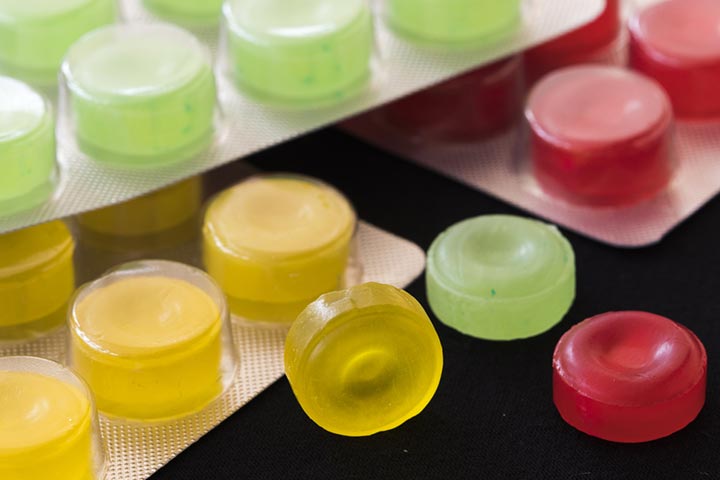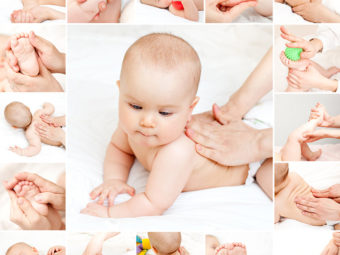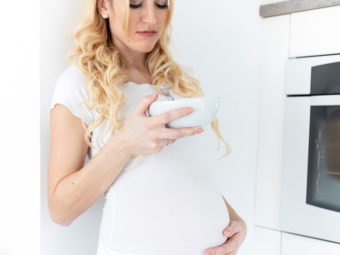
Image: iStock
It is not uncommon for you to experience sore throat or throat irritation during the nine months of pregnancy. You may consider cough drops in such cases. However, some expectant mothers may be apprehensive of using cough drops during pregnancy due to their effects on the pregnancy.
Read this post to learn about cough drops’ safety and side effects during pregnancy. We also suggest precautions and alternatives to cough drops during pregnancy.
What Are Cough Drops?
Image: Shutterstock
Cough drops are medicated candies that dissolve slowly on oral consumption. They offer relief from cough and sore throat caused by common cold and allergies. The medicine lubricates and soothes the throat tissues that are irritated due to cough and cold. They are also referred to as throat lozenges and available as over-the-counter medications (1).
Are Cough Drops Safe During Pregnancy?
Cough drops are usually considered safe when used temporarily for short-term ailments such as a short-lived cold or sinus inflammation called sinusitis. But, you should avoid overindulgence of these drops and exercise caution to prevent long-term usage. Also, not all medications work the same way for everyone. Therefore, it is best to consult your doctor before taking them (2).
Dr. Ila Dayananda, board-certified obstetrician/gynecologist from Brooklyn, New York, says, “Cough drops with menthol or honey are usually safe to use during pregnancy. However, it’s essential to avoid those containing alcohol or artificial ingredients. If you experience a sore throat while pregnant, acetaminophen is generally considered safe for pain relief and fever reduction.”
A mother of two, who maintains a pregnancy blog called Baby Spoon, shares her experience dealing with a cough during her pregnancy. In one of her blog entries, she expresses, “The bad news is that I’m sick. Grossly sick. Not sleeping sick. Miserably sick. Urgent Care told me ‘You can’t take anything because it might hurt the baby! Maybe just some cough drops. But then only sparingly.’ Luckily, my lady doctor gave me a long list of medications I am ok to take that will not hurt the baby and I’m hopeful that at some point soon I will stop coughing (i).”
Besides cough drops, some other over-the-counter medications you can safely try after consulting a doctor are (3):
- Diphenhydramine (Benadryl)
- Dextromethorphan (Robitussin; cough suppressant)
- Guaifenesin (Mucinex; expectorant)
- Mentholated cream (Vicks Vapor Rub)
- Mentholated or non-mentholated cough drops
- Pseudoephedrine (Sudafed; after 1st trimester)
- Acetaminophen (Tylenol)
How Do Cough Drops Work?
The composition of cough drops varies significantly from one brand to another. They contain both active and inactive ingredients that we list next.
Active ingredients
| ACTIVE INGREDIENTS | PROPERTY |
|---|---|
| Benzocaine (4) | The anesthetic that aids to numb a sore throat |
| Eucalyptus (5) | Expectorant that soothes a sore throat and thins mucus |
| Zinc Gluconate Glycine (6) | Boosts immunity, and wards off the virus |
| Pectin (7) | Treats swelling or irritation |
| Dextromethorphan (8) | Cough suppressant, and helpful for a persistent cough and sore throat |
| Guaifenesin (9) | Expectorant that thins mucus |
| Menthol (10) | Cooling property that relieves congestion and numbs the throat |
| Peppermint oil (10) | Cooling property that treats nasal congestion |
Inactive ingredients
Image: IStock
Apart from the primary active ingredients mentioned above, cough drops may also contain certain inactive ingredients, which include natural herbs such as:
- Sage
- Thyme
- Wild thyme
- Horehound
- Hyssop
- Mallow
- Elder
- Lemon balm
- Linden flowers
Since there are no specific warnings about the usage of these herbs during pregnancy, their effect on the expectant mother or the fetus is not known.
Which Ingredients Are Safe To Use During Pregnancy?
Cough drops containing guaifenesin and dextromethorphan are widely considered safe during pregnancy (11). Menthol drops are also regarded as safe, but there aren’t enough studies to prove they are safe or not during pregnancy (12).
Take cough drops that only help in relieving cough and sore throat. Those containing simple ingredients work better.
The list of popular cough drops that are considered safe for pregnant women are (13) (14):
- Halls menthol cough suppressant/Oral anesthetic drops
- Vicks menthol cough suppressant/Oral anesthetic drops
- Cepacol sore throat and cough drops
- Chloraseptic sore throat and cough drops
No matter what brand of cough drops you consider taking, it is advisable to check with your doctor before you do.
Which Ingredients Are Unsafe For Pregnant Women?
You should be aware of taking cough drops containing herbal ingredients as most of them are not tested for safety. Also, some include alcohol and should be avoided.
 Point to consider
Point to considerAre There Any Side Effects Of Taking Cough Drops During Pregnancy?
It is natural to reach out for that couch drop or lozenge when you have a cold or a sore throat during pregnancy, but it is important to consider the possible risks of taking it.
- Suppress mucus production: Mucus is essential for the body to get rid of the germs (15). Cough drops could suppress the formation of mucus (16), trapping the germs within and increasing the chance of infection later.
- Aggravate sugar levels: If you have gestational diabetes, cough drops will hike the blood sugar levels as many of them have high sugar content (17). Ingredients such as corn syrup and other sweeteners lead to a sudden increase in the sugar levels.
- Uncertain ingredients: Some herbal ingredients are not safe for consumption, and therefore always check the composition and consult the doctor before you take medicine.
 Quick fact
Quick factRead on to know more about the precautions you should take before taking cough drops during pregnancy.
Precautions To Consider While Using Cough Drops
Image: IStock
Some of the dos and don’ts while taking cough medications are as follows:
- Read the composition to check if you are allergic to any ingredient.
- Check the expiry date as the medicine either loses its efficacy or taste or might be outright dangerous for you or baby when expired.
- Get sugar-free cough drops when you have the risk of gestational diabetes.
- In the case of severe mucus formation, consider medical advice before choosing any cough drops.
When cough drops are not ideal for you, try the alternatives for relief.
Alternatives To Cough Drops
Image: IStock
Sometimes, before trying cough drops, certain alternatives might help provide comfort. It is better to choose natural remedies over medications to treat cough and sore throat (18).
- Gargle with salt water (mix 1tsp salt in 8oz of water). It loosens mucus, relieves sore throat, and also kills the bacteria. Do not swallow the salt water because excess salt in drinks or diet may lead to medical conditions like high blood pressure or pre-eclampsia in pregnancy.
- Drink teas – chamomile tea with honey, ginger tea made of fresh ginger root, lemon and honey tea, and clove tea with honey
- Homemade chicken soup
- Suck on a piece of garlic; it helps ease the sore throat and pain
- Get enough sleep
- Drink lots of fluids to clear a nasty cold
- Use a humidifier or vaporiser in your room
 Quick tip
Quick tipWhen To Call A Doctor?
Image: Shutterstock
Refrain from using cough drops, skip home remedies and seek medical treatment by seeing a doctor if you are experiencing any of the following conditions:
- Cough and soreness of throat that lasts for two or more days
- The cough does not get better in a week
- Having a temperature of 101°C or more
- Having skin rash, nausea, vomiting, headache or swelling
Frequently Asked Questions
1. Can coughing hurt my baby in the third trimester or cause a miscarriage?
The usual cold and flu symptoms are usually not harmful to the developing baby (21). However, you might want to consult your doctor if you have a long-term cough or cough that is accompanied by wheezing, chest pain, or discolored mucus. Some mothers may also develop whooping cough, which needs immediate medical attention. Vaccination can help avoid whooping cough (22).
2. How long does it take for a cough drop to work?
Most cough drops do not have cough suppressing properties (23). However, most people find instant relief when they take a cough drop due to ingredients such as menthol which helps in soothing an irritated throat.
3. Are Luden’s, vitamin C, and elderberry cough drops safe during pregnancy?
To relieve cough during pregnancy, doctors suggest cough drops and a cool mist humidifier (24). However, research on Luden’s, vitamin C, and elderberry-containing cough drops is limited to validate their usage. Therefore, it is recommended to consult your doctor to understand their benefits and risks.
4. Can cough drops harm my developing fetus?
No direct link between consuming cough drops and its effect on developing fetuses has been observed. However, cough drops might have high sugar content, making mothers susceptible to an increased risk of gestational diabetes and subsequent birth trauma (17). Therefore, it is always advised to consult with your doctor before consuming.
5. Can I take cough drops during any trimester of pregnancy?
Typically, consuming cough drops to treat short-term ailments is safe during any trimester of pregnancy, considering prior consultation with a doctor has been taken (2).
6. How often can I use cough drops during pregnancy?
No research suggests the recommended dosage for cough drops and their frequency in a day. Your doctor can guide you in sharing information regarding its safety and dosage during pregnancy.
7. Can cough drops interact with other medications I take during pregnancy?
Studies have not been conducted yet upon examining the possibility of an interaction between cough drops and other medications. Therefore, it is recommended to have a consultation with your gynecologist before taking it.
Taking cough drops during pregnancy can offer relief from cough and sore throat, and they may not seem as hazardous as other medications taken during pregnancy. However, it is best to be cautious to keep yourself and the baby safe, as excessive cough drops may reduce mucus production, raise blood sugar levels, and include unknown herbal components that could be harmful. Therefore, exercising caution before taking any medicine during pregnancy is recommended. Also, consult your doctor and select which cough drops you can use when pregnant.
Infographic: Ingredients To Look Out For In Cough Medications During Pregnancy
One should be careful when using over-the-counter medicines, including cough medications, during pregnancy. They may contain ingredients that could be harmful to maternal and fetal health. This infographic highlights some ingredients in cough medications that may not be safe throughout pregnancy. Illustration: Momjunction Design Team
Key Pointers
- Cough drops are usually considered safe if taken temporarily and in moderation.
- It is advisable to consult a doctor as they may contain active ingredients such as Benzocaine, Dextromethorphan, Guaifenesin, certain herbs, and others.
- Sweeteners present in cough drops may aggravate sugar levels.
- You can gargle with salt water, drink ginger tea, use a humidifier, or take other alternative measures to relieve your symptoms. Seek medical help if they persist.
Personal Experience: Source
MomJunction articles include first-hand experiences to provide you with better insights through real-life narratives. Here are the sources of personal accounts referenced in this article.
i. 28 Weeks/7 months.https://babyspoon.wordpress.com/2018/07/24/28-weeks-7-months/
References
- Cough Drop- menthol lozenge; National Institutes of Health (NIH) (2018)
https://dailymed.nlm.nih.gov/dailymed/fda/fdaDrugXsl.cfm?setid=87fd9e18-8681-47a4-8614-239b8b55d69f&type=display - Taking Medicine While Pregnant; University of New Mexico Hospital (2017)
https://hsc.unm.edu/health/patient-care/womens-health/doc/patient-education/medicines-during-pregnancy-english.pdf - Medicine Guidelines During Pregnancy; Cleveland Clinic
https://my.clevelandclinic.org/health/drugs/4396-medicine-guidelines-during-pregnancy - Benzocaine; The United States Pharmacopeial Convention Inc (2000)
https://www.lewisu.edu/academics/biology/pdf/benzocaine.pdf - Raho G Bachir and M Benali; Antibacterial activity of the essential oils from the leaves of Eucalyptus globulus against Escherichia coli and Staphylococcus aureus; NCBI (2012)
https://www.ncbi.nlm.nih.gov/pmc/articles/PMC3609378/ - Zin; PeaceHealth
https://www.peacehealth.org/medical-topics/id/hn-2934002 - A. Black and D. A. Hill; Over-the-Counter Medications in Pregnancy; American Academy of Family Physicians (2003)
https://www.aafp.org/pubs/afp/issues/2003/0615/p2517.html - Dextromethorphan (DXM); Center for Substance Abuse Research (CESAR);
https://cesar.umd.edu/cesar/drugs/dxm.asp - Roberto Silva et al.; Is guaifenesin safe during pregnancy; The Journal of Family Practice (2007)
https://mospace.umsystem.edu/xmlui/bitstream/handle/10355/3626/IsGuaifenesinSafePregnancy.pdf?sequence=1 - Edward T. Moldenhauer; Common Herbal Medications; Naval School of Health Sciences (1999)
https://webapp1.dlib.indiana.edu/virtual_disk_library/index.cgi/4931363/FID2617/DATA/operationalmed/meds/herbals.htm - Pregnancy Safe Over-the-Counter Medications; MCG Health (2010)
https://paws.augusta.edu/pub/patient-education/adult-info/Documents/O/Over-the-counter_medications.pdf - Maximilian Arthur Kesner; Fighting the Sickness Cough Drops; Science in Our World: Certainty and Controversy (SC200) (2016)
https://sites.psu.edu/siowfa16/2016/09/15/fighting-the-sickness-cough-drops/ - Lupe Cruz; OTC medicines that are okay during pregnancy; Intermountain Healthcare (2017)
https://intermountainhealthcare.org/blogs/otc-medicines-that-are-okay-during-pregnancy/ - Jeffrey Boyle; The best over-the-counter medications during pregnancy; Sanford Health (2017)
https://news.sanfordhealth.org/womens/safe-medications-during-pregnancy/ - Anne Trafton; Fighting bacteria with mucus; MIT News (2012)
https://news.mit.edu/2012/fighting-bacteria-with-mucus - Bronchitis; Cedars-Sinai
https://www.cedars-sinai.org/health-library/diseases-and-conditions/b/bronchitis.html - Gestational Diabetes; University of Wisconsin Hospitals
https://www.uwhealth.org/files/uwhealth/docs/obgyn/Gestational_Diabetes_Handout.pdf - Patient Education: Cough or Cold What to Take; University of Florida Health
https://shcc.ufl.edu/services/primary-care/health-care-info-online/patient-education-cough-or-cold-what-to-take/ - Cough Drops
https://missouripoisoncenter.org/is-this-a-poison/cough-drops/ - The Best Natural Cough Remedies
https://www.medanta.org/patient-education-blog/the-best-natural-cough-remedies-2 - Cough and Cold During Pregnancy;
https://americanpregnancy.org/healthy-pregnancy/pregnancy-complications/cough-cold-during-pregnancy/ - Whooping cough and pregnancy;
https://www.pregnancybirthbaby.org.au/whooping-cough-and-pregnancy - Relieving a Cough;
https://www.peacehealth.org/medical-topics/id/ug1887 - Women’s Center
https://www.queens.org/wp-content/uploads/FINAL_nh223-488_obPacket-2.pdf




























